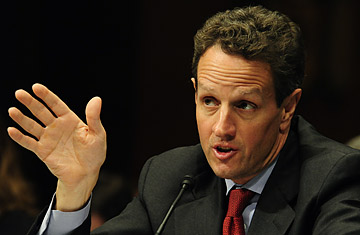
U.S. Treasury Secretary Tim Geithner
It was Tim Geithner's first big day as Treasury Secretary: a speech at 11 outlining the revamped bank bailout that he has redubbed the Financial Stability Plan, then an appearance before the Senate Banking Committee at 2:30 to take questions on the topic.
How did he do? By the favorite quickie measure of financial journalists — the performance of the stock market — he was a complete flop. The S&P 500 fell almost 5% over the course of the day, with the sharpest drop coming just as Geithner began his speech in the Cash Room of the Treasury Building. (See the worst business deals of 2008.)
Explaining the stock market's behavior is always something of a mug's game, but there was a consensus that the main problem seemed to be that Geithner was just too vague. "Unfortunately, he led the market to believe there would be more details," says Kurt Karl, U.S. economist for the insurance firm Swiss Re. "You can't make the equity market happy every day, I guess."
It was actually President Obama who had led the world to believe Geithner would have more to say, declaring at his press conference last night that the Treasury Secretary would "be announcing some very clear and specific plans." And viewed through a longer-term lens, Geithner's don't-promise-much approach might turn out to be awfully smart. If one leaves aside the actual details of his not-all-that-detailed proposal, one of the most important jobs of a Treasury Secretary in troubled times like these is to instill confidence. Geithner's predecessor, Hank Paulson, was a believer in doing so by means of bold statements. That served him well for a while, but when the crazy events of the fall made Paulson repeatedly eat his words, confidence in his leadership fell quickly. It is always a mistake, Geithner's mentor (and Obama's top economic adviser) Larry Summers said in October, to try to "infuse confidence through words rather [than] through deeds."
Geithner seems to have opted instead to underpromise and — one hopes — overdeliver. "We will make mistakes," he said in his speech Tuesday morning. "We will go through periods in which things get worse and progress is uneven or interrupted." (See the top 10 financial collapses of 2008.)
When he's speaking from prepared text, Geithner is less than riveting. He has an odd, somewhat robot-like way of scanning the audience when he talks: look left, look center, look right, look center, etc. Sitting in the witness chair before a congressional committee, though, he is brilliant — at least when he's not having to spend all his time apologizing for screwing up his tax returns, as he did during his confirmation hearing last month. Today, before the Senate Banking Committee, he answered the questions he could easily answer with brisk clarity and deflected the ones he couldn't with aplomb. ("I understand what you're asking," he said with the faintest hint of a smile when Montana Democrat Jon Tester wanted to know what was the upper limit of money the government would put into a troubled bank, "but I just want to be careful in responding to you.")
None of this means Geithner will be a success as Treasury Secretary. He's still got to actually succeed at nursing the financial system back to health. "Hank [Paulson] was in emergency-room care," says Paul McCulley, a managing director and head of the short-term-bond desk at money-management giant Pimco, "whereas Tim is still in emergency-room care but also preparing a room for further care after the emergency." He at least shows signs of having a good bedside manner.
